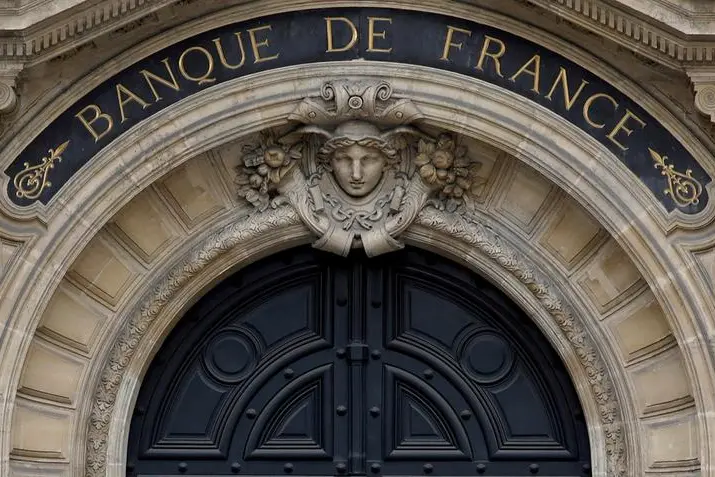PHOTO
Some of the world's biggest investors are staying away from France's government debt, feeling underpaid to take on exposure to its deteriorating public finances.
France's budget deficit came in well above target at 5.5% of economic output in 2023, rising from the year before in contrast to other major euro zone economies.
The government has already hiked its 2024 deficit target to 5.1% from 4.4%. Deficit reduction plans lack credibility without further details to curb spending, France's public finance watchdog said on Wednesday.
None of this is likely to sound encouraging to credit ratings agencies, which begin reviewing the country next week.
Euro zone debt sustainability worries have typically centred on poorer Southern European states rather then the bloc's second largest economy and biggest government bond market with 2.46 trillion euros ($2.62 trillion) outstanding.
But unease around surging debt levels globally, including in the United States, is growing, with the IMF on Wednesday urging countries to rein in spending.
"We're heavily underweight French bonds," said David Zahn, head of European fixed income at Franklin Templeton, which manages $1.4 trillion in assets. "It's really the fiscal situation that concerns us."
France's finance ministry declined to comment for this article, but a government spokesperson told journalists on Wednesday its deficit reduction plans were "solid, coherent and responsible".
French bond yields have edged higher relative to top-rated Germany and the Netherlands in recent weeks, while lower-rated Italy and Spain's borrowing costs have narrowed relative to France's over the past twelve months.
Fitch, which downgraded France to AA- last year, and Moody's are due to publish their reviews of the country on April 26. S&P Global follows on May 31.
Moody's, which rates France Aa2, said last month that Paris would need to step up spending cuts. S&P Global's negative outlook on the country's AA rating raises the risk of a downgrade.
UNDERESTIMATED?
Chris Jeffery, head of macro strategy at Britain's largest investor Legal and General Asset Management, said markets are underestimating French risk.
Underweight French bonds since mid-2023, he notes Spain's credit ratings are several notches below France's despite a lower deficit and debt-to-output ratio - an "unsustainable" difference.
France has "some of the weakest macro fundamentals of the major European economies and the rating agencies are excessively generous to them because of their political status and size", Jeffery said.
The roughly 50 basis point premium France currently pays over Germany's debt is in line with 2022 and 2023's average, LSEG data shows, but is around double pre-pandemic levels .
Franklin Templeton's Zahn said French bonds weren't compensating investors for the risks and should trade like Spain's, which offer an additional 30 basis points in yield over Germany's debt.
However, investors said fiscal slippage may be tolerated for longer as France's bonds are seen as a relatively safe asset for the euro zone which faces a shortage of high quality debt, given the size of its market and its AA rating - the second highest category.
"We're neutral on France, because we just don't think that the fiscal story can cause enough volatility," said Schroders fund manager James Ringer, who expects France to retain its AA ratings for some time.
France may also benefit from economic growth which is still higher than the euro zone average.
REFORMS
France, like Italy, is expected to face a deficit reduction procedure with its budget gap unlikely to fall below the European Union's 3% limit, despite announcing 10 billion euros of budget cuts in February with a further 10 billion planned.
Markets have also shrugged off the risks in Italy where bonds have outperformed regional equivalents despite worse metrics than in France, albeit helped by a juicier premium.
Rabobank expects a French deficit of 3.6% by 2028 as interest costs surge. A fall below 3% would require the deficit excluding interest payments to stay near 0% for a few years, it added - challenging for a government which spends the most relative to output among developed economies.
Absent policy changes, Morgan Stanley sees France's debt rising to 132% of output by 2040 from 111% now, while it expects Spain and Italy's to be roughly unchanged at 111% and 136%, respectively.
France's scattered party system makes reforms harder, said Ales Koutny, head of international rates at Vanguard, the world's second largest asset manager.
Underweight France, he prefers Spanish debt.
Reforms or higher growth would mean "a better trajectory that would give us a bit more confidence to own French bonds," said Koutny. ($1 = 0.9385 euros)
(Reporting by Yoruk Bahceli in Amsterdam and Dhara Ranasinghe in London, additional reporting by Leigh Thomas in Paris; editing by Kirsten Donovan)





















